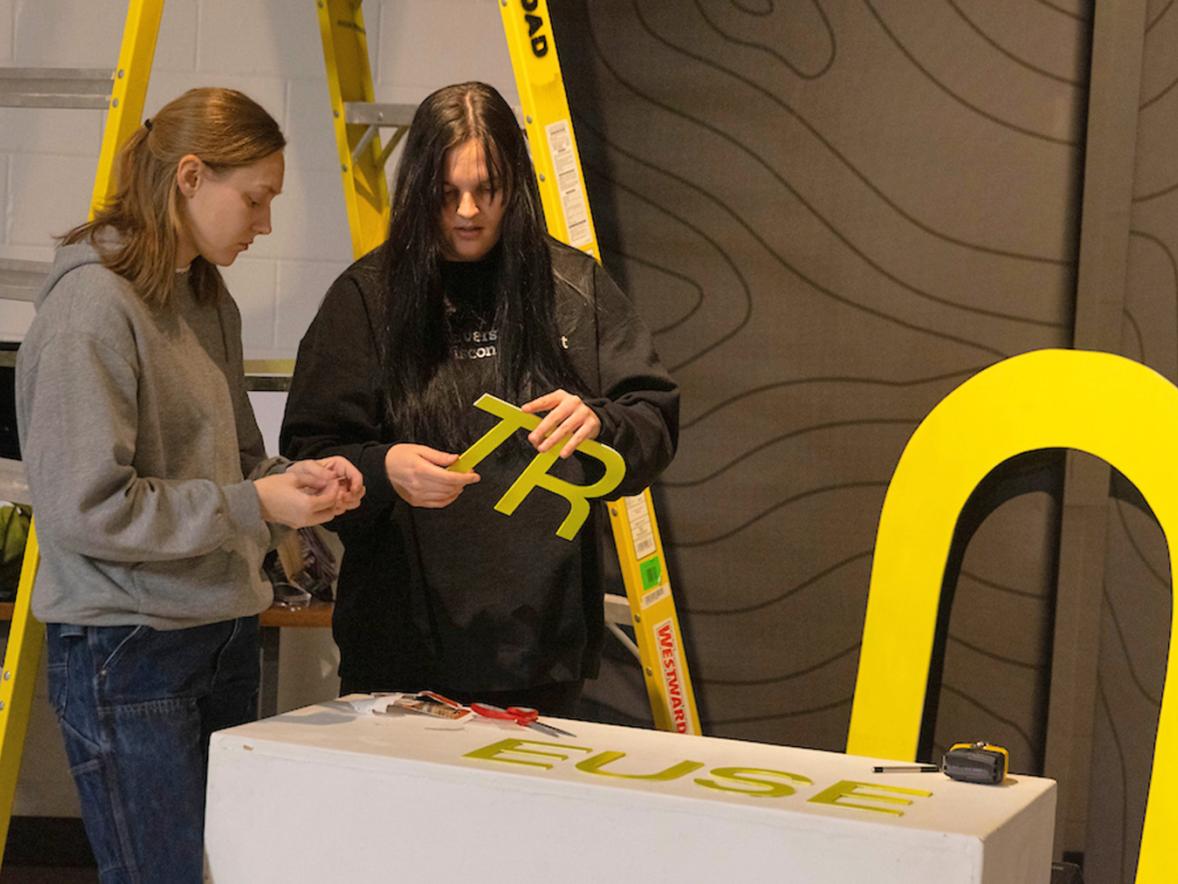Four students at UW-Stout helped breathe new life into 108-year-old architectural fixtures.
Over the course of a year, they handcrafted new furniture pieces, incorporating brass register grates – components from the university’s historic Harvey Hall – into two side tables.
The Harvey Hall grate project was a cross-campus collaboration, as industrial and product design Program Director Jennifer Astwood guided the students, with support of Dean of College of Arts and Human Sciences Maria Alm and University Archivist Heather Stecklein.
“When trying to figure out ways to honor the legacy of the building, we wanted to offer students a special project, something outside of the scope of what could be accomplished in classroom time,” Alm said. “With the polytechnic nature of the project, we could also be true to that legacy of Stout and our mission of hands-on learning. Making furniture aligns with that. This was a major learning experience that echoes the history of design at the university.”
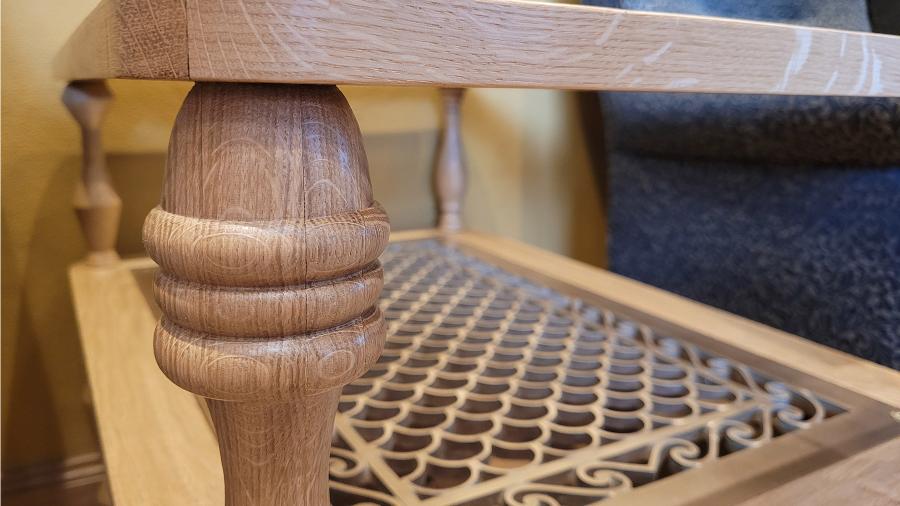
Industrial and product design students involved in the project were:
- Annamarie Burch, ideation team, a senior from Plover
- Jordan Jentsch, ideation team, a spring 2024 graduate from West Bend
- Amelia Dobbratz, fabrication team, a senior from Waupun
- Ethan Romo, fabrication team, a senior from Minneapolis
Through research, several ideation designs, hours in the fabrication process and collaboration with local businesses, they delivered professional-level, quality products.
Astwood appreciates Alm’s and Stecklein’s support. “We couldn’t have done this without Maria and Heather. It takes good mentors like them who trust in the possibility of what could happen, especially since we hadn’t done a project like this before,” she said.
Stecklein believes the students’ applied research and hands-on fabrication process is a direct continuity of history at UW-Stout.
“It echoes the designs and experiences of their academic ancestors. Our students today are engaged in their education, just as they have been since the founding of the university,” she said.
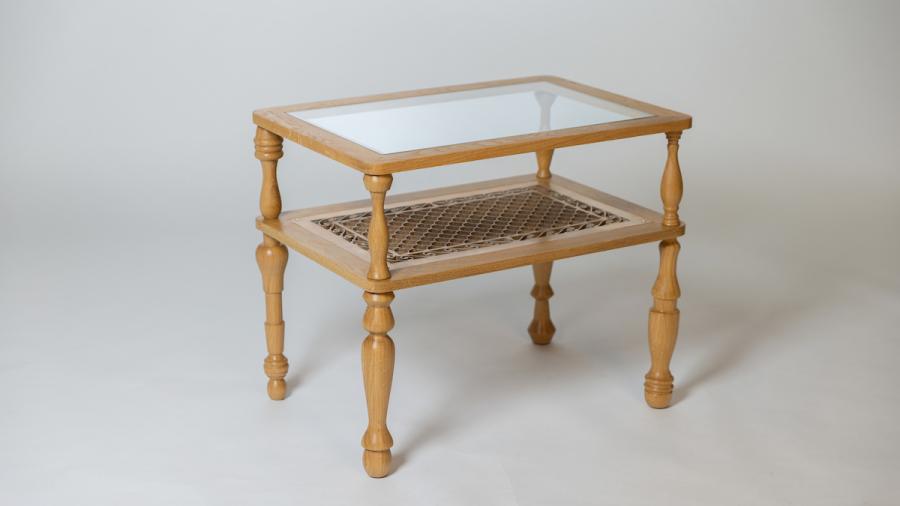
The grates were in the university’s original library, which was on the first floor of Harvey Hall from its opening in 1916, to 1954 when a separate library building opened.
The finished tables are now fixtures in the CAHS dean’s conference room—a space rich in history, as it once served as President Lorenzo Dow Harvey's office.
An unveiling event, open to the public, will be from 3:30 to 4:30 p.m. on Tuesday, July 30, in Harvey Hall 355. Astwood and Stecklein will introduce the project and student teams. The dean’s conference room, Harvey Hall 170, will be open before the event from 3 to 3:30 p.m. and after from 4:15 to 4:30 p.m. for viewing of the project. Alm will be available to answer questions. Those unable to attend in person may join virtually via Microsoft Teams.
The pieces will also be on display at the Polytechnic Summit, when the global event returns to UW-Stout May 18-21, 2025, kicking off the university’s Year of Design celebration.
The project was funded by donations to the CAHS, including gifts made at the time of the building renovation to highlight historic projects related to Harvey Hall. Contact the dean’s office to schedule a viewing: cahs@uwstout.edu.
Echoing their academic ancestors
Last fall semester, Burch and Jentsch researched different eras of furniture and design concepts and how aesthetics have changed. They visited Design Within Reach, a modern furniture company in Edina, Minn., to see recent and upcoming trends.
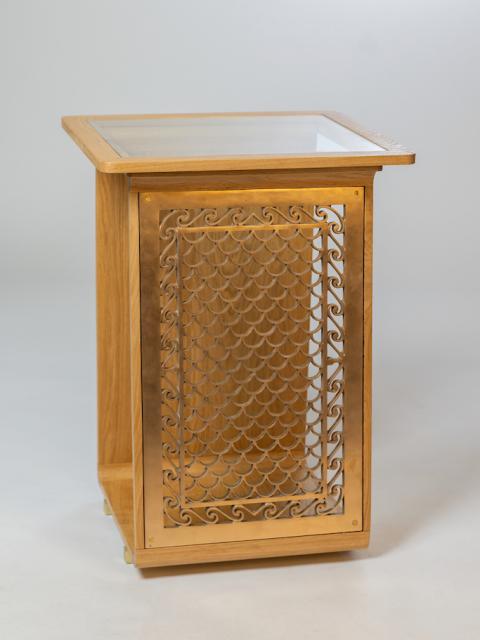
Referring often to Stecklein’s expertise, they viewed archival photographs of furniture at UW-Stout, including student-designed, custom-made furniture crafted for specific spaces and purposes on campus.
Examples included tables used in a millinery classroom, with custom drawers and leaves that folded out; as well as the circulation desk in the Harvey Hall library and two tables that are now in the Archives’ reading room.
More recently, in 2019, students built five historic-themed benches that now adorn Harvey Hall corridors, each inscribed with one of the university’s five historic names: Stout Manual Training School, Stout Institute, Stout State College, Stout State University and UW-Stout, with fonts appropriate for the time periods. The project was funded by private donations.
“Students have designed and fabricated a prolific number of products to be used by their fellow students in various campus spaces,” Astwood said. “One set of students might say, ‘We need this piece to help us do this,’ and another set of students creates it just so.”
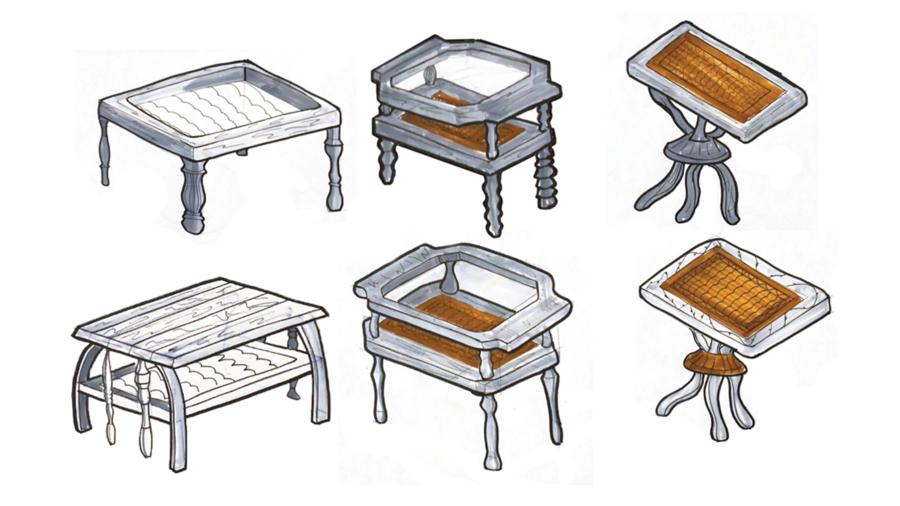
For the side table designs for the dean’s conference room, Burch and Jentsch noted the golden yellow and cream color palette, oaken structures and geometric floor patterns, and the shape of light fixtures in Harvey Hall.
Burch’s research delved into the ornateness of the historical pieces she viewed from the turn of the century and early 1900s. Her digital design iterations included eight uniquely shaped legs – four to serve as the base and support the lower shelf and grate and four to support the glass tabletop. The glass allows the grate to be viewed from above.
“It was obvious from the get-go that Annamarie’s initial design was going to be the final one crafted, with some small adjustments in her renderings. She played off the rules of design and had fun with it,” Astwood said.
Jentsch was interested in what art and design looked like at UW-Stout in the 1950s and 1960s. Her iterations were more contemporary, featuring a mid-century modern look, similar to aspects from the university’s second library space in what is now the Vocational Rehabilitation building.
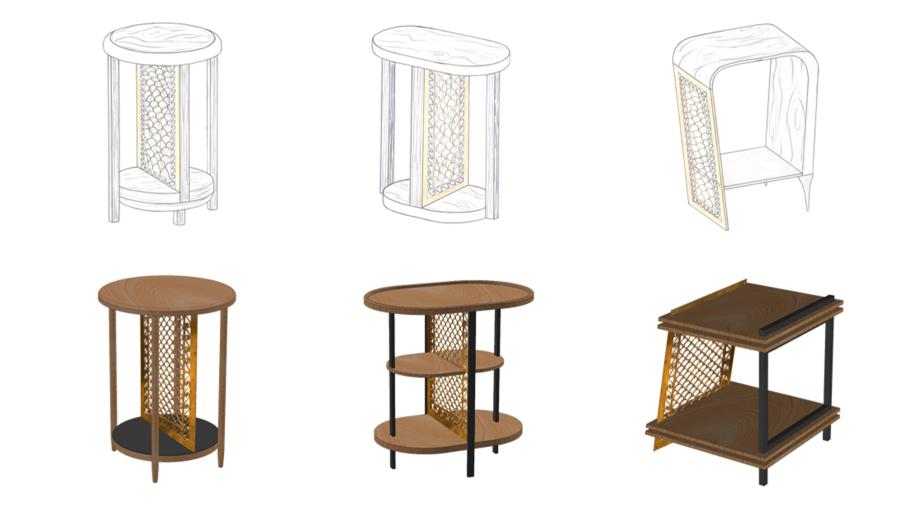
Her design, which resembles a small podium, originally had a front frame to hold the grate. The front stood parallel with the back frame. But if the frames were left parallel, the weight of the grate would tip the table forward on its face.
They worked to tilt the front frame so the grate would sit at an angle, adjusting the table’s center of gravity to keep it from tipping. Her table would include a glass top to celebrate the grate.
With the digital renderings complete, the project was ready for the next step.
Turning the tables to bring history to life
Dobbratz and Romo began the build process at the start of the spring 2024 semester.
As lab monitors in the university’s Materials and Process Lab in Applied Arts, assisting their peers with woodworking and metalwork machinery, tools and projects, Dobbratz and Romo are familiar with the shop.
“Amelia spearheaded the fabrication process and sourcing to make sure that Annamarie’s and Jordan’s designs became reality,” Astwood said.
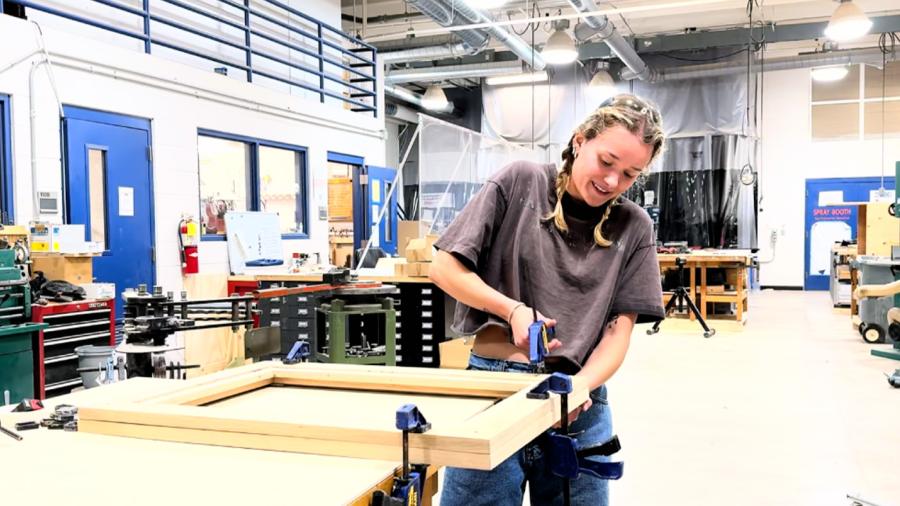
“As third-year industrial design students, we have skills and experience in prototyping. But I had never built something from raw material before. This was my first experience making a professional-level piece,” said Dobbratz, for whom the project served as an independent study.
Dobbratz and Romo worked with three local companies to source their materials:
- Schmitt Timber, in Spring Valley, provided raw-cut white oak lumber.
- White City Glass, in Menomonie, produced the glass panes for the tabletops.
- Steel Towne, in Elk Mound, produced the brass feet needed for Jentsch’s design.
They jointed and planed the raw-cut oak to quarter-inch boards. But they didn’t realize how the shop humidity would affect the wood, which warped and needed to be jointed and planed again to re-create a flat face before being cut to length, glued and clamped.
Dobbratz created eight stencils for the legs of Burch’s design. She turned the legs individually on a lathe, using a caliper to measure the progress as the wood rounded under the blade.
“My hands were cramping while gluing and clamping oak blocks together,” she said. “And turning takes time. The bigger base legs took two hours each to turn. Oak is a very hard wood, and I had to continually sharpen the tools.”
Jentsch’s design was more difficult to construct because of the tilted angle of the front face. Romo re-created the curve with a router and used heavy brass feet to weigh down the bottom of the table.
“This project helped us learn to advocate for ourselves, connect with local businesses, learn to do through mistakes, ask questions and research,” Dobbratz said. “Where now so many things are prefabricated, we got to start from scratch and live the whole process. I enjoyed it all.”
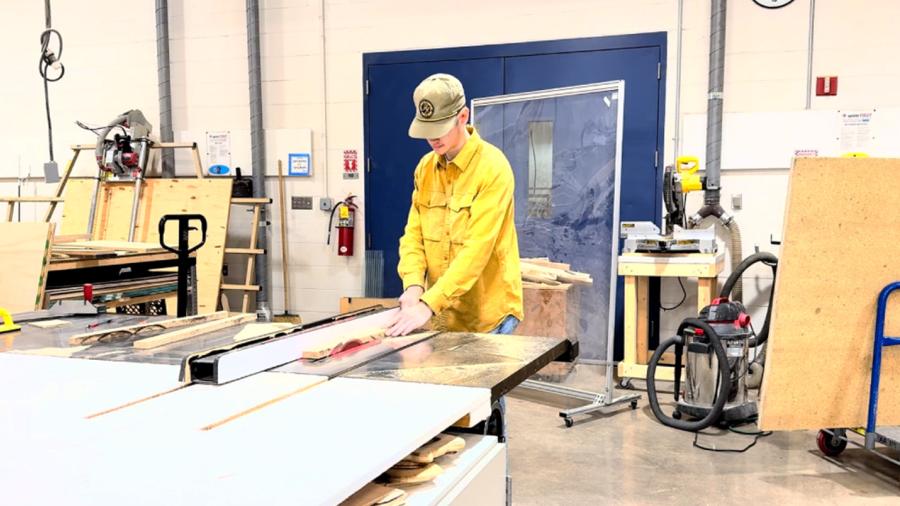
“All the students were wonderful to work with,” Astwood said. “What’s great about a student-teacher relationship is that we trust each other and can push back and forth on ideas. Here at Stout, we’re trying to make people that can work and solve problems together. It’s one thing to design something; it’s another to manufacture it. These students made it happen.”
Dobbratz received the Merit Award at UW-Stout’s third annual Design Wisconsin event, held at Milwaukee Tool this spring. Dobbratz presented three products she designed, a lamp, a hearing device and a table. The award is sponsored by the Milwaukee chapter of the Industrial Designers Society of America.
Honoring the Harvey Hall legacy
The basis for the grate project began more than a decade ago during the Harvey Hall renovation, when they were nearly discarded. The renovation’s aim was to update building systems and create classrooms with modern technologies to encourage applied learning, while preserving historic spaces, such as the theater.
Before the building was emptied for renovation, Alm and Facilities Management Associate Director Zenon Smolarek walked through to decide what nonessential items should be salvaged. The brass grates were two of the items.
John Walter, a custodian lead in Harvey Hall, took the grates home and painstakingly removed layers of white paint that had covered the brass, and cleaned and polished them in his free time. He returned one grate to Alm when the renovation was completed in 2016, the building’s 100th anniversary.
Walter retired from UW-Stout in 2020 and returned the second grate in spring 2023.
“The Harvey Hall grate project would never have happened without John. Cleaning the historic pieces was a labor of love. It held a personal meaning for him with his ties to the building and deep roots in the community,” Alm said.
Further details on the project can be found in the University Library’s Institutional Repository, an online collection of theses, capstone projects, research and design projects available freely to the public.
A QR code to a permalink for the repository record will be engraved on a brass plate on each piece of furniture and will include the design records, photographs and this article, available to anyone who scans the code for years to come.





